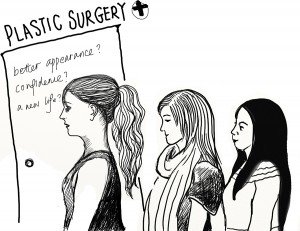Plastic surgery doesn’t define person
There’s no denying it: All around the world, the culture of nip and tuck is being cultivated, grown and blown up to epic proportions. A fascinating dichotomy arises, one where a plastic surgery culture of outer beauty and covetousness exists next to issues of insecurity about our frail bodies and an itching sense of dissatisfaction with how we look.
In recent news, this infatuation with the plastic has taken Afghanistan by storm. Though most surgeries done back in the day were reconstructive — patch-ups for war injuries, medical treatment for cleft lips — things have taken a turn, shedding light on the fact that cosmetic surgery at large plays on the age-old ideologies of societal concepts of beauty.
In that sense, this growth of interest in plastic surgery on a global scale might not be an indicator of an increasingly image-obsessed society but a continuing symptom of a society that has always been this way.
In the spirit of being progressive, just because something has always been this way does not mean that it’s right. However, though critics of plastic surgery might poke at all the negative aspects of the industry, in the end, it’s the patients that have to live with the decision, and if happiness lies beyond that rainbow, it may just be enough.
In an article by The National, one patient, after undergoing nose enlargement surgery, said, “In Afghanistan, being beautiful means having big eyes and the right-size nose.” For her, it is a chance to feel good about her looks.
For others, surgery might mean a reminder of a new lease on life they’ve decided to start, or an end to a life of shame and self-consciousness about that one crook in the nose or that enlarged mole. Let’s face it: The standards of beauty out there, whether it’s a well-defined face, high cheekbones or coveted “double eyelids,” weigh on many as social pressure from all sides — the workplace, the classroom, at home and, most dangerously, from within. Is it wrong to conform to society’s standards of beauty when it’s practical and a large part of one’s livelihood? For better job prospects? For happiness?
Plastic surgery might be something we turn toward to satiate an unending yearning for more meaning and fulfillment, as a way to resolve deep-rooted insecurities. Or perhaps it’s to give that much-needed boost of self-esteem that a prettier face lends in society.
Many find the growth of plastic surgery for cosmetic purposes alarming, and would be quick to denounce such practices, pointing to the increasing superficiality of modern culture as something needing reform. But at the same time, it’s important to identify that the issue of cosmetic surgery lies in shades of gray.
Where does the line between emphasizing beauty with clothes and heavy makeup and cosmetic surgery exist? Who has the right to judge who is morally justified to go under the knife? To what degree does getting a double-eyelid surgery for self-esteem constitute a fair choice versus a dangerous, unnecessary obsession with body image?
No matter what, a human being’s worth cannot be reduced to appearances. And if that’s the case, it’s equally unfair to condemn plastic surgery as it is to encourage it. After all, even if it is the outside that changes, it is always the inside that counts most.
Valerie Yu is a freshman majoring in biological sciences and English. Her column “Heart of the Matter” runs Fridays.


Generally I have interest in reading blog posts that covers plastic surgery topics. Here i came to find your blog when i was searching through Google. I really feel better while reading the post. Especially the last paragraph is superb to read.